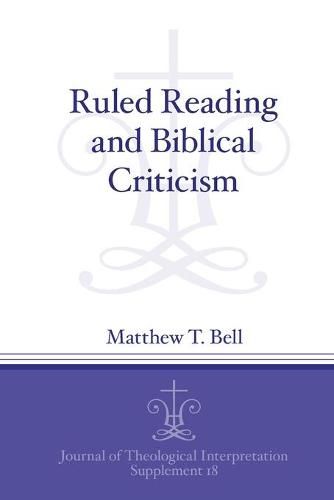Readings Newsletter
Become a Readings Member to make your shopping experience even easier.
Sign in or sign up for free!
You’re not far away from qualifying for FREE standard shipping within Australia
You’ve qualified for FREE standard shipping within Australia
The cart is loading…






In Ruled Reading and Biblical Criticism, Matthew T. Bell contends that the gulf in interpretive priorities between ancient and modern readers has been exaggerated and that careful study of early Christian reading practices suggests that it is both possible and productive to recontextualize early Christian ruled reading for a postmodern setting.
Modern prejudice holds that ancient Christian interpretation was relatively unconcerned with history and concomitantly determined to foist extrascriptural doctrinal commitments onto scripture, silencing those layers of scripture’s meaning that modern criticism has been most concerned with uncovering. In this book, Bell argues that, when the ethos and theology of reading in the early Church are taken into account, premodern interpretive priorities turn out to be less implausible than the modern world has believed them to be. Through close reading of ancient Christian texts, Bell outlines an ontology of scripture wherein the relationship between early Christianity’s Rule of Faith, on one hand, and its scriptures, on the other, was expressly constructed as a hermeneutical spiral, the slant of which was designed to attend to and be edified by textually mediated conundrums and intellectual provocations. Viewed along that spiral, the Church’s Rule was as scriptural as the Church’s catalog of scriptures was ruled.
This book will be welcomed by academics who study early Christianity and scripture, as well as scholars interested in reconsidering Christian hermeneutical questions for a postmodern age.
$9.00 standard shipping within Australia
FREE standard shipping within Australia for orders over $100.00
Express & International shipping calculated at checkout
In Ruled Reading and Biblical Criticism, Matthew T. Bell contends that the gulf in interpretive priorities between ancient and modern readers has been exaggerated and that careful study of early Christian reading practices suggests that it is both possible and productive to recontextualize early Christian ruled reading for a postmodern setting.
Modern prejudice holds that ancient Christian interpretation was relatively unconcerned with history and concomitantly determined to foist extrascriptural doctrinal commitments onto scripture, silencing those layers of scripture’s meaning that modern criticism has been most concerned with uncovering. In this book, Bell argues that, when the ethos and theology of reading in the early Church are taken into account, premodern interpretive priorities turn out to be less implausible than the modern world has believed them to be. Through close reading of ancient Christian texts, Bell outlines an ontology of scripture wherein the relationship between early Christianity’s Rule of Faith, on one hand, and its scriptures, on the other, was expressly constructed as a hermeneutical spiral, the slant of which was designed to attend to and be edified by textually mediated conundrums and intellectual provocations. Viewed along that spiral, the Church’s Rule was as scriptural as the Church’s catalog of scriptures was ruled.
This book will be welcomed by academics who study early Christianity and scripture, as well as scholars interested in reconsidering Christian hermeneutical questions for a postmodern age.